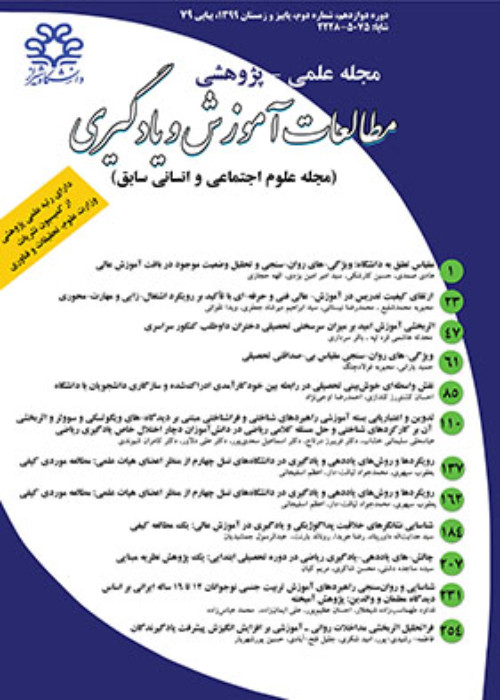The Effect of Autonomy Supportive Environment on Self-Regulated Learning in Online Education: The Mediating Role of Learning Specific Inner Speech
In recent years, experiences related to the spread of Covid-19 and advancements in technology have rendered the use of virtual education inevitable. However, students often lack the necessary skills to effectively utilize this mode of education. In face-to-face education, the guidance of a teacher in regulating learning is readily available, but in virtual education, this possibility is significantly reduced. Consequently, learners are compelled to employ more self-regulation skills to achieve success. The concept of self-regulation in the realm of education and learning is encapsulated under the title of self-regulated learning. Self-regulated learning is a process whereby learners activate and sustain their emotions, behaviors, and cognitions, systematically adjusting them to achieve their learning goals. The application of self-regulation skills in virtual and online education is referred to as self-regulated learning in online education. Self-regulation skill, akin to any other skill or ability, is influenced by numerous individual and social factors. According to Vygotsky’s socio-cultural theory, social rules and instructions are internalized during cognitive development, and individuals utilize them to direct their behavior, emotions, and thoughts. In the developmental process, these internalized rules are termed inner speech. Inner speech aids learning, initially guided by the social environment and others, to be directed and regulated by individuals themselves, transitioning from other-regulation to self-regulation. Research evidence suggests that this form of speech enhances both cognitive and behavioral self-regulation in childhood and adulthood, and the use of inner speech can improve cognitive function (behavior and cognition regulation). When inner speech is employed in assignments and learning situations, it is referred to as learning-specific inner speech. Research shows that self-management, as one of the components of learning-specific inner speech, has a positive relationship with executive functions and logical reasoning. Also, according to self-determination theory, the internalization of societal guidelines and values is influenced by the social and cultural context of that society. If the social environment supports basic psychological needs, such as the need for autonomy, the ability for self-regulation increases. From this perspective, it can be posited that social environments, such as the family and academic environments that support the need for autonomy, can facilitate inner speech and self-regulated learning. Considering that most studies on this skill have focused on face-to-face education, the researchers of the present study were prompted to investigate what factors aid students’ self-regulation in online education. The importance of this research lies in the fact that possessing self-regulated learning skills in online education is more crucial than in face-to-face education because in online education, teachers have less direct supervision and students have more freedom in their actions. The aim of this study was to investigate the mediating role of learning-specific inner speech in the relationship between an autonomy-supportive environment and self-regulated learning in online education. Research Questions: The questions of the present research include: 1. Does the autonomy-supportive environment have a direct effect on self-regulated learning in online education? 2. Does the autonomy-supportive environment have a direct effect on learning-specific inner speech? 3. Does learning-specific inner speech have a direct effect on self-regulated learning in online education? 4. Does learning-specific inner speech play a significant mediating role in the relationship between an autonomy-supportive environment and self-regulated learning in online education?
In this research, a sample group of 267 university students (including 186 females and 81 males) was selected via multi-stage cluster random sampling. Participants completed the Learning Climate Questionnaire (Williams et al., 1996), Perceptions of Parents Scale (Robbins, 1994), Learning-Specific Inner Speech Scale (Xiang et al., 2019), and Self-Regulated Learning Online Questionnaire (Jansen et al., 2017). These questionnaires were provided to them online. Structural equation modelling was performed using AMOS software, version 24.
The results of the structural equation modelling, conducted using AMOS software version 24, indicated that among the two dimensions of autonomy-supportive environments, only teacher autonomy support significantly predicts learning-specific inner speech. Furthermore, both dimensions of the autonomy-supportive environment and learning-specific inner speech significantly predicted self-regulated learning in online education. Learning-specific inner speech also played a significant mediating role in the relationship between teacher autonomy support and self-regulated learning in online education.
The results of this study align with theoretical foundations and research which underscore the importance of an autonomy-supportive environment and learning-specific inner speech in self-regulated learning. One limitation of this research is its correlational design; therefore, caution should be exercised when interpreting the results in a causal manner.
- حق عضویت دریافتی صرف حمایت از نشریات عضو و نگهداری، تکمیل و توسعه مگیران میشود.
- پرداخت حق اشتراک و دانلود مقالات اجازه بازنشر آن در سایر رسانههای چاپی و دیجیتال را به کاربر نمیدهد.


